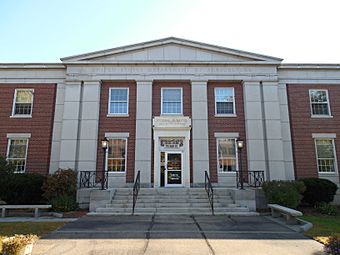Federal Building (Laconia, New Hampshire) facts for kids
Quick facts for kids |
|
|
Federal Building
|
|

Federal Building
|
|
| Location | 719 Main St., Laconia, New Hampshire |
|---|---|
| Built | 1939 |
| Architect | Simon, Louis |
| Architectural style | Classical Revival |
| NRHP reference No. | 11000766 |
| Added to NRHP | October 25, 2011 |
The former Federal Building in Laconia, New Hampshire, is a historic building located at 719 Main Street. It is a two-story structure made of brick, designed in a style called Classical Revival. Louis A. Simon designed the building, which was constructed between 1939 and 1940.
This building was originally home to the offices of the White Mountain National Forest. Today, it serves the community by housing a local social services agency. Because of its historical importance, the building was added to the National Register of Historic Places in 2011.
Discovering the Federal Building
What the Building Looks Like
Laconia's former Federal Building stands on the north side of downtown Laconia. It is on the east side of Main Street, just north of where it meets the Winnisquam Trail. This building has two stories and was first built in a "T" shape. Its strong frame is made of steel and concrete.
The outside of the building is covered with red brick and granite. It shows a simpler version of the Classical Revival style. The front of the building has three main parts. The middle part, where the entrance is, sticks out a little. This section has three openings, separated by wide granite columns called pilasters. More pilasters are found at the corners of the building.
These pilasters reach up to a decorative band called an entablature. On this band, you can read "United States Department of Agriculture." Above this is a shallow, triangular shape called a pedimented gable. The windows on the outer parts of the building have granite sills. The corners of the building also have decorative granite blocks called quoins.
Its History and Purpose
The Federal Building was designed by Louis A. Simon. He was the main architect for the United States Treasury Department at the time. Construction took place from 1939 to 1940. In 1966, the building was made larger, changing its shape to an "H." This new part matched the original style.
The building's first job was to hold the main offices for the White Mountain National Forest. This forest is managed by the United States Forest Service, which is part of the United States Department of Agriculture. Inside the building, you can still see hints of its original use. The lobby has two special paintings, called murals. These murals show scenes related to forestry. Artists Philip Guston and Musa McKim created these beautiful artworks.
 | Percy Lavon Julian |
 | Katherine Johnson |
 | George Washington Carver |
 | Annie Easley |



